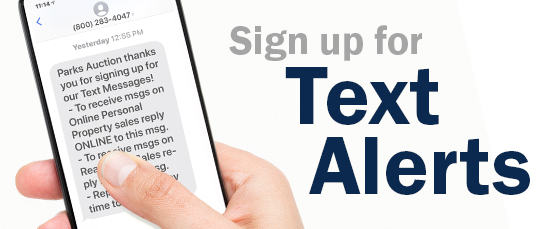Auction Buyer’s Guide
Auctions are unique – in experience, sound and practice – but are more common than some people realize.
Much of our daily lives are impacted by auctions. For example, the New York Stock Exchange controls the value of stocks, livestock auctions have an impact on the cost of food products and energy prices are determined at the Chicago Mercantile. The interest rate on money is even controlled by auctions. And, last but not least, we have all heard of eBay, where you can buy and sell almost anything!
The difference between eBay and Parks is that most of our auctions are live and on site. Many auction attendees find the experience addictive. They report that there’s nothing quite like the thrill of finding something they want and then bidding against others who want the same thing. However, you don’t have to be a seasoned auction attendee to be able to experience the thrill of auctions. Auctioneers across America are glad to welcome new bidders to their auctions. And though almost everyone has heard the old story about the person who attended an auction, scratched his nose and came home with an item he’d not intended to buy, pay no heed to that myth.
Feel free to just get your feet wet – don’t think you have to go to your first auction ready to bid.
You are welcome to attend any of our auctions to get a feel for how they are conducted. Watch and listen, then move on to bidding if that makes you comfortable. Our auctioneers will spend some time addressing commonly asked questions and explaining how the auction is going to work. Always remember to ask questions at our auctions if you don’t understand something. Our auctioneers and staff want people to continue to attend auctions, so we do all we can to encourage repeat business!
When you arrive at an auction site:
- Register for a bidder number.
- Read the terms printed on or displayed on posters, brochures or handouts.
- Ask questions if you don’t understand a policy.
- At our personal property sales, inspect the merchandise you’re interested in, as most is auctioned on an “as is, where is” basis. This means it is not guaranteed. When you buy an item, you become responsible for it.
- Keep in mind that you’ll pay for the items you purchase before you leave the auction, even if you aren’t taking everything with you that day. We accept cash, check, MasterCard or Visa for your convenience.
At our real estate sales, most property is open for inspection two weeks prior to the sale by appointment or generally one hour prior to the auction. Terms vary per property; however, they generally include a specified amount of earnest money and a specified closing date. These terms are in all pre-printed materials and announced day of sale.
In order to bid at an auction, you need to make contact with the auctioneer or a ringperson.
A ringperson or ground man is someone who takes bids from the audience and then passes those on to the auctioneer. To bid, hold up your bid card, your hand or shout “yes.” The auctioneer or ringperson will make eye contact with you, take your bid and immediately turn and seek another bid. You can remove yourself from the process at any time by shaking your head “no” or saying “no” if the auctioneer or ringperson turns your way. If an auctioneer or ringperson misinterprets any of your signals, simply report the mistake right away.
At the conclusion of the auction make sure to take all of your items with you and pay the cashier before leaving. If your purchase involves real estate you will be asked to sign a contract and exchange earnest money.






__footer.png?v=1733172462)
